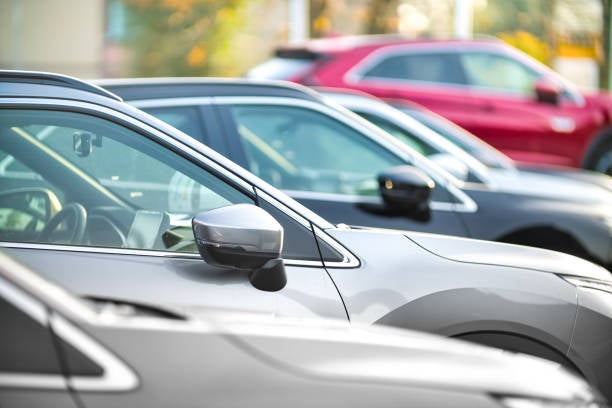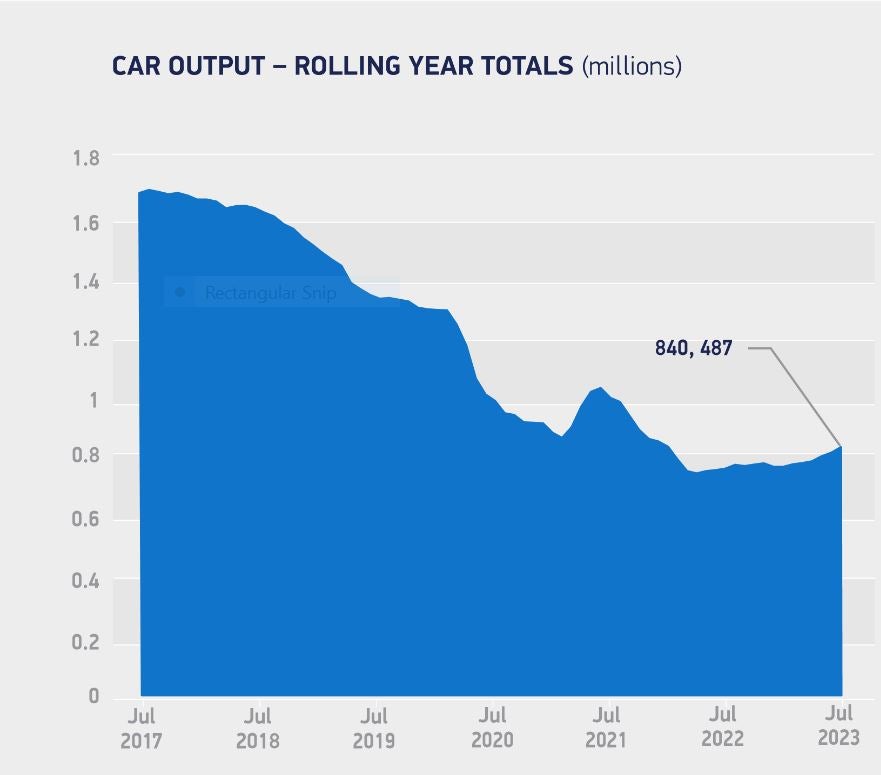
UK car production surged in July, rising 31.6% to mark the sixth consecutive month of growth, according to the latest figures published today by the Society of Motor Manufacturers and Traders (SMMT).
76,451 units rolled off factory lines as UK car makers continued their recovery from recent difficulties, notably global chip shortages, to deliver the latest models to buyers at home and overseas.

Despite this growth, however, output remained -29.4% lower than pre-pandemic July 2019.
The SMMT reported that manufacturing output for the UK rose 13.7% to 13,187 units in the month while exports increased more than a third (36.1%) to 63,264 units, representing by far the bulk of all production in July.
More than eight-in-ten (82.8%) cars made were shipped overseas, with the top destination markets being the EU, US, China, Japan and Australia. Combined they accounted for almost 85% of all UK car exports last month.

Production of the latest, high-tech hybrid electric (HEV), plug-in hybrid (PHEV) and battery electric vehicles (BEVs) continued apace, with combined volumes rising 73.9% to 30,180 units and representing almost two in every five (39.5%) cars made in July. Since January, UK car makers have now turned out more than 200,000 of these vehicles, almost double the amount produced in the same period last year, and a total of 526,619 cars overall, an increase of 14.2% year-on-year.
How well do you really know your competitors?
Access the most comprehensive Company Profiles on the market, powered by GlobalData. Save hours of research. Gain competitive edge.

Thank you!
Your download email will arrive shortly
Not ready to buy yet? Download a free sample
We are confident about the unique quality of our Company Profiles. However, we want you to make the most beneficial decision for your business, so we offer a free sample that you can download by submitting the below form
By GlobalDataMike Hawes, SMMT Chief Executive, said, “Six months of growth shows that British car production is recovering and, with electrified models increasingly driving volumes, the future is more positive. Recent investment announcements have undoubtedly bolstered the sector but global competition remains tough. If we are to attract further investment and produce the next generation of zero-emission models and technologies, we need a coherent strategy that builds on our strengths and supports all aspects of advanced automotive manufacturing.”
The figures come after the publication of the latest independent production outlook, which suggests total UK car production will reach around 860,000 units this year, an uplift of 10.9% on 2022, as the sector recovers from three tough Covid years, with the possibility to get production back to the million mark in 2028.
Lisa Watson, Director of Sales at Close Brothers Motor Finance, said: “The UK’s motor manufacturing industry continues to bounce back as it aims to return to pre-pandemic levels. The easing of challenges that have previously impacted manufacturers is enabling an increase in production as demonstrated by another month of strong year-on-year growth.
“With the recent ULEZ expansion, manufacturers will be keeping an eye on any changes in consumer trends and the uptake of alternative fuel vehicles (AFVs). So far, the rise in new electric vehicle (EV) registrations has been significantly driven by fleet and business vehicles, whilst consumer demand has been relatively subdued.
“With recent research from Close Brothers Motor Finance showing that 70% of dealers believe buyers are looking for cheaper cars due to the cost-of-living crisis, manufacturers and dealers will need to adjust plans accordingly to ensure production and sales growth remains stable.”
John Veichmanis, CEO of carwow, says: “It feels particularly relevant that UK manufacture of hybrid, plug-in hybrid and battery electric vehicle volumes is up again this month.
“Our data shows that 38% of carwow customers would now consider an EV as their next car – with 25% of people encouraged to go electric thanks to the new clean air zones like the ULEZ expansion.
“But while there’s an appetite for people to switch to EV, a lack of infrastructure still puts many people off. The ongoing growth in EV manufacturing is positive for the British automotive industry, but it must be matched by investment in infrastructure to encourage more private buyers to consider EVs in the coming years.”
House of Lords launch inquiry into EVs






